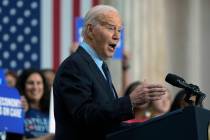EDITORIAL: How government makes it hard to start a small businesses
If you want more small businesses, make it easier to be an entrepreneur. It sounds obvious, but you’d be shocked at how difficult it is to start a business throughout the country.
The Institute for Justice recently published a report on “Barriers to Business.” It details the many obstacles would-be business owners face. The IJ analysis examined the intricacies of starting different types of enterprises, including restaurants, bookstores, food trucks, barbershops and a home-based tutoring company. It studied rules and regulations at the local level in 20 cities across the country.
The most obvious hurdle is cost. The average cost in licenses, permits and fees to start a restaurant was more than $5,300. San Francisco topped the list at $22,000.
It would be bad enough if that was one big bill, but it’s not. Would-be restaurant owners have to pay more than a dozen fees on average in the studied cities. Phoenix had 11 different fees. San Francisco had 17.
That gets to another problem — red tape. An entrepreneur has only so much time. Yet navigating the bureaucracy can be a full-time job on its own and represents a deterrent to many potential job creators.
For instance, opening a bookstore seems straightforward. Rent some retail space. Build the necessary inventory. Perhaps do some advertising, and then start selling. There’s no risk of food poisoning. No liquor licenses to acquire. One would think the regulatory process would be comparably simple.
Nope. The average number of regulatory steps necessary to open a bookstore, according to the IJ investigation, was almost three dozen. That includes fees, agencies, in-person activities and forms. Of the cities studied, Newark, N.J., had erected the most roadblocks for bookstore owners, requiring a whopping 74 steps. All of these mandates, especially zoning, can take months or even years to complete.
It’s a testimony to the American can-do spirit that anyone ever opens a business.
These hyper-regulatory requirements are counterproductive for potential business owners, customers and overall prosperity. Local policymakers should be proactive in making it as easy as possible to open a business. That includes streamlining processes, making information accessible online and getting rid of as much red tape as possible.
There have been some steps forward. Government Technology reported this year that the city of Las Vegas expanded the number of services it offers online. That includes allowing businesses and developers to digitally file documents. Good.
Small-business owners are the lifeblood of a healthy market economy. As a recession looms, it’s even more important that local governments do everything they can to make life easy for would-be entrepreneurs.






















